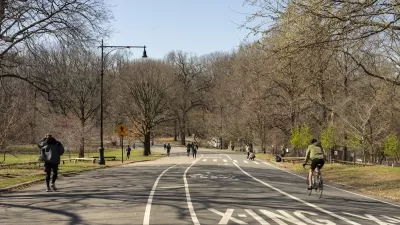It should come as no surprise that Eduardo Porter, who writes the Economic Scene column for The New York Times, is not enamoured by technological silver bullets like desalination as ways for California to survive it's four-year plus drought.
California’s main challenge is not technological, but economic and political," writes Eduardo Porter. "One thing to keep in mind is that the state still has plenty of water. It just doesn’t have enough for every possible use, no matter how inefficient and wasteful."
However, he does list some of the innovations mentioned by the former state secretary of food and agriculture, Mr. A.G. Kawamura, used to reduce and replenish water supplies:
- Irrigation systems have evolved from furrows to sprinklers to drips in the three generations since his family began farming in what is now the highly urbanized Los Angeles basin.
- These days, he said, there’s a water district experimenting with human waste, extracting methane and hydrogen to use for fuel and injecting the water into the aquifer.
- Australians have developed a technique to irrigate with brackish water, using the brine as fertilizer and cleaning out the water for use on site.
- He also sees promise in techniques to harvest water from the air.
Porto is critical of Gov. Jerry Brown's decision "to exempt farmers from California’s first restrictions ever on water use, even though they consume some 80 percent of the surface water used in the state." It "underscores the scale of the political challenge," he writes.
But he's critical of urban and suburban water users as well—pointing to their over-consumption compared to other areas.
California’s cities consume 178 gallons per person per day, on average. That’s 40 percent more than the per capita water consumption in New York City and more than double that of parched Sydney, in Australia.
Porto goes on to discuss the role of of climate change, not as the cause of the drought, but how it will impact water supplies "in the not-so-distant future," citing two recent studies.
His warning to those believing in 'silver bullets'—"the risk is that belief in our technological capabilities to adapt to whatever comes our way might get in the way of a more comprehensive response."
Hat tip to Michael Keenly.
FULL STORY: In Parched California, Innovation, Like Water, Has Limits

Planetizen Federal Action Tracker
A weekly monitor of how Trump’s orders and actions are impacting planners and planning in America.

Congressman Proposes Bill to Rename DC Metro “Trump Train”
The Make Autorail Great Again Act would withhold federal funding to the system until the Washington Metropolitan Area Transit Authority (WMATA), rebrands as the Washington Metropolitan Authority for Greater Access (WMAGA).

The Simple Legislative Tool Transforming Vacant Downtowns
In California, Michigan and Georgia, an easy win is bringing dollars — and delight — back to city centers.

The States Losing Rural Delivery Rooms at an Alarming Pace
In some states, as few as 9% of rural hospitals still deliver babies. As a result, rising pre-term births, no adequate pre-term care and harrowing close calls are a growing reality.

The Small South Asian Republic Going all in on EVs
Thanks to one simple policy change less than five years ago, 65% of new cars in this Himalayan country are now electric.

DC Backpedals on Bike Lane Protection, Swaps Barriers for Paint
Citing aesthetic concerns, the city is removing the concrete barriers and flexposts that once separated Arizona Avenue cyclists from motor vehicles.
Urban Design for Planners 1: Software Tools
This six-course series explores essential urban design concepts using open source software and equips planners with the tools they need to participate fully in the urban design process.
Planning for Universal Design
Learn the tools for implementing Universal Design in planning regulations.
Smith Gee Studio
City of Charlotte
City of Camden Redevelopment Agency
City of Astoria
Transportation Research & Education Center (TREC) at Portland State University
US High Speed Rail Association
City of Camden Redevelopment Agency
Municipality of Princeton (NJ)




























